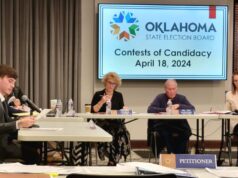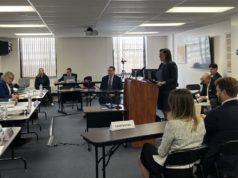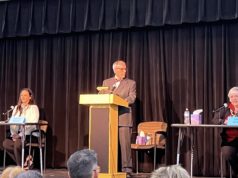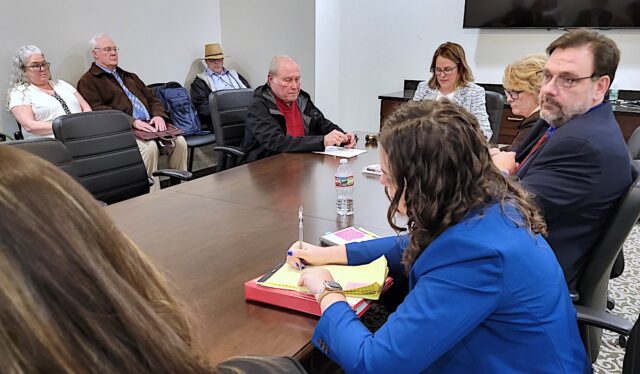

(Update: Pending confirmation from the Oklahoma State Election Board, former Rep. Wayne Pettigrew has been nominated to replace Cheryl Williams as the Republican representative on the Oklahoma County Election Board. Ernie Wiggins was nominated to serve as alternate. The following article remains in its original format.)
After a 10-hour executive session, members of the State Election Board voted unanimously Wednesday night to remove the Republican member and her alternate from the three-member Oklahoma County Election Board for failing to perform their duties and exhibiting behavior unbecoming of an election official.
Underscoring the allegations against Cheryl Williams and Jenni White, the State Election Board also referred the matter to Oklahoma County District Attorney Vicki Behenna and Oklahoma Attorney General Gentner Drummond for review.
Williams and White said they are being punished for asking questions about various election procedures and wanting to ensure appropriate rules were being followed since they were appointed last summer as Republican Party representatives. Their concerns increased after observing how votes from the Jones School District’s bond election on Nov. 14 were tabulated, and they said they were alarmed further during the counting of results in the special House District 39 primary Dec. 12.
“They don’t know what a lawsuit is until I get a hold of them,” Williams said. “They called me a liar, and I’m not the one lying. That’s defamation of character, and to me it’s trying to destroy my character. That is not appropriate.”
Election Board Chairwoman Heather Cline and State Election Board members Tim Mauldin and Mignon Lambley directed Election Board Secretary Paul Ziriax to work with legal counsel from the Oklahoma Attorney General’s Office to refer the matters related to Williams’ and White’s removal for possible investigation. They also directed Ziriax to request the Oklahoma County Republican Central Committee to submit nominees to replace Williams and White by Feb. 7 so the Election Board can consider filling the vacancies before the Feb. 13 general election for HD 39 in Edmond.
Ziriax declined to comment after Wednesday’s marathon meeting, which started at 9 a.m. with a packed room of Williams supporters and ended 10 hours later in a State Capitol left mostly empty after dark.
“It’s a personnel matter and the motions speak for themselves,” Ziriax said.
However, in a Jan. 10 letter to Williams and White, Ziriax scolded the pair for using the words “illegal” and “fraudulent” in emails and letters sent to him to describe alleged procedural issues.
“There is no evidence provided that illegality or fraud has occurred in the matters raised in your complaints, and, in my opinion, it was improper for you to describe these issues in this manner,” he wrote. “Additionally, even if the claims made in your complaints were entirely true, there is nothing that casts doubt upon the accuracy or validity of the elections in question.”
County election boards are responsible to the State Election Board for governing elections within their county. The State Election Board appoints two members of each county election board — one Democrat and one Republican, plus two alternates — to serve terms of four years beginning May 1. The State Election Board also appoints the secretary of each county election board for a term of two years beginning May 1. The secretary of each county election board is the chief administrative officer of the county election board and is a voting member of the board but cannot serve as chairman or vice chairman. The three-member State Election Board appointed by the governor and confirmed by the State Senate may remove the secretary or any member of a county election board at any time.
Williams, who has been involved with the Oklahoma Republican Party since 1996 and has served as its vice chairwoman, and White said the state board’s decision to pursue possible criminal charges and its 10-hour executive session seemed excessive when it has the power to remove county board members at its discretion anytime.
“I’ve asked questions since I started in June, and they’re not well received,” Williams said. “My whole goal and my whole work ethic was so that we could have confidence in our elections. I’m not about election integrity, I’m about election confidence. I’ve never badmouthed our elections.”
The third member of the Oklahoma County Election Board, Election Board Secretary Doug Sanderson, declined comment about Williams’ and White’s removals when contacted Thursday morning.
“It wouldn’t be proper for me to make a comment,” he said. “I think the board’s action speaks for itself.”
Glover did not respond to a request for comment prior to the publication of this article.
Complaints announced against Cheryl Williams, Jenni White
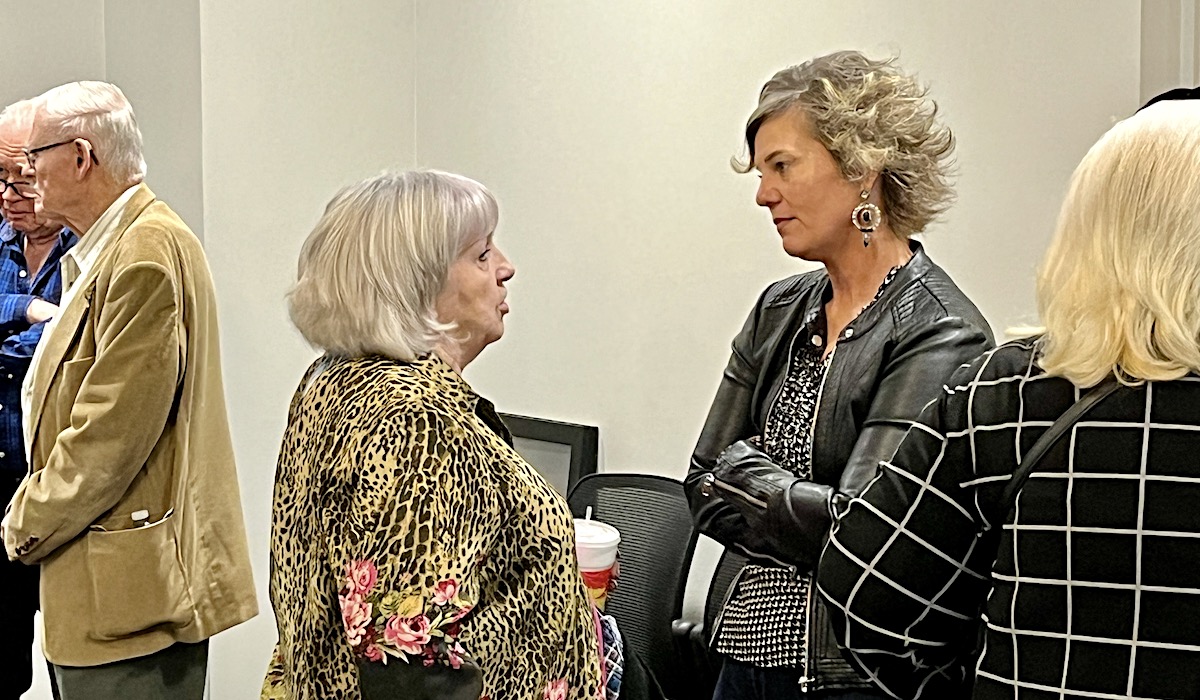
After returning from executive session about 7:20 p.m., Cline read the complaints against Williams and White. A crowd that nearly filled a meeting room at the State Capitol when the meeting began at 9 a.m. had gradually dissipated during the day, but about a half dozen remained when the board returned from its 10-hour executive session and voted 3-0 to remove Williams and White.
Williams, who ran unsuccessfully for the Edmond Public Schools Board of Education in 2022, has received criticism in the past for making divisive comments at public meetings about Pride Month and school library books. The complaints announced Wednesday against Williams were:
- Lack of candor and truthfulness to the Oklahoma County Election Board, secretary of the State Election Board and the State Election Board;
- Failure to disclose potential conflicts of interest related to a matter before the Oklahoma County Election Board;
- Failure to faithfully perform her duties prescribed by law, including but not limited to voting against the certification of a validly conducted election;
- Apparent misrepresentation of her vote cast at an Oklahoma County (Election) Board meeting and requiring minutes to reflect a vote contrary to audio evidence;
- Lack of respectfulness and professionalism with comity to the Oklahoma County Election Board staff;
- Failure to bring forward alleged concerns in a time manner to the (Oklahoma) County Election Board staff; and
- Behavior unbecoming an Oklahoma election official.
Williams said she questioned why the Oklahoma County Election Board members were counting absentee ballots on Dec. 11 when state law called for the results not to be counted until Election Day, or Dec. 12. She eventually was shown a letter from Ziriax giving permission, as allowed by law, for Sanderson to count absentee ballots a day early, but not until after Dec. 15 when the county election board met to certify the Dec. 12 results. Williams said she abstained from voting because she was unsure whether the Dec. 11 tabulation was legal.
“I thought I had done something illegal because we didn’t know we had permission to do that until after the fact,” Williams said. “I didn’t certify because I thought I had done something illegal. When we did certification, I did not have anything in hand saying we had something legally.”
On Dec. 11, Williams said she and board member David Glover, the Oklahoma County Democratic Party appointee, were unable to observe any of the counting process in person. Both were placed in a room the entire time absentee ballots were being handled and counted and were required to watch the procedure via closed-circuit television, which was also made available to members of the public who were in attendance. Williams said Sanderson was the only member of the Oklahoma County Election Board present in the room to observe all absentee ballot processing and counting, but she said there were times when he was out of range of the camera handling absentee ballots, which made direct observation impossible. She said she and Glover were unable to see the absentee ballot box being opened or the ballots being counted. According to the Oklahoma Administrative Code, Williams said, the county election board chairman and vice chairman shall be present and shall observe the counting process.
Williams said the conflict-of-interest allegation is based on her making a contribution of $700 to Ronda Peterson, one of the Republican candidates in the HD 39 primary, who finished second in the GOP primary only 27 votes behind Erick Harris. Williams said the State Election Board believes that is why she voted not to certify the election results.
The complaints against White, a former mayor of Luther, were:
- Failure to faithfully perform her duties prescribed by law;
- Purposefully and/or recklessly disseminating false information about Oklahoma’s election system and procedures;
- Failing to immediately remove said false information from the public domain;
- Lack of respectfulness and professionalism in written communication with county election board staff;
- Failure to bring forward alleged concerns in a timely manner to the Oklahoma County Election Board staff; and
- Behavior unbecoming an Oklahoma election official.
White, who cofounded the nonprofit group Reclaim Oklahoma Parent Empowerment in 2008, said she attended the county election board’s Dec. 12 meeting on Election Night to observe election tabulation procedures because Williams couldn’t attend because of car troubles. She said a training manual for county election board members states they are required to observe. However, she said when she and Glover were asked to accept and process 32 absentee ballots, they were able to check the affidavits on the outer envelopes, but the ballots were removed to the counting room. She said she asked that they be allowed to go into the counting room to witness the counting of the absentee ballots, but she said Sanderson denied her request. White said she refused to sign a seal for the absentee ballot box after they were tabulated because she wasn’t allowed to observe the counting of the ballots nor see the ballots being placed in the box.
“I want to know what duties I did not discharge,” said White, who outlined her observations in a Jan. 7 blog post on her website.
As far as disseminating false information about Oklahoma’s election system and procedures, White said she and a guest, Wendi Dial, state director of Restore Liberty, recorded a live podcast on YouTube, during which time they were misinformed about the Voter Portal on the State Election Board’s website. In the podcast, they questioned the security and procedures for voters to change registration information.
When she discovered her error, White said she kept the video online but posted a disclaimer: “The portion about the online voter portal is WRONG. Rep. Eric Roberts (R-OKC) ran – and passed – a bill last year to make sure that all that information was password protected. We didn’t go far enough through the portal on the livestream. To change any information there, you must have a Social Security number and/or password. Thank you Rep. Roberts!”
Roberts showed up at Wednesday’s meeting, briefly visiting with those gathered in attendance.
LOFT report: Absentee voting process enables election integrity
Williams and White sent letters and emails to Ziriax in December about the concerns they had with their inability to observe, in their opinion, the tabulation of ballots in the Nov. 14 Jones School District election and the Dec. 12 HD 39 special primary.
Ziriax responded in a Jan. 10 letter that it was his understanding that the use of the closed-circuit television system that allows the Oklahoma County Election Board members who are present to observe various activities occurring in nearby rooms has been reviewed and approved by the Oklahoma County District Attorney’s Office.
“Based on your own description, the board members were present at the public board meeting(s) in question and the various activities occurring in nearby rooms were displayed on video in the board meeting room,” he wrote.
Sanderson, Oklahoma County’s election board secretary, said Thursday the closed-circuit television system was installed in 2020 after more people showed up to watch the counting of ballots. It was also during the height of the COVID-19 pandemic, which he said was a contributing factor.
“People started attending our board meetings for opening absentees, and we had to develop a metric where the public had access to view certain things and the board could still do their actions,” he said. “It was authorized by the district attorney’s office.”
Ziriax in his letter noted that the Oklahoma County Election Board was one of the offices personally observed by the Oklahoma Legislature’s Legislative Office of Fiscal Transparency during its review of the absentee voting process in Oklahoma. Its report issued in March 2023 included findings that Oklahoma’ absentee voting processes enable election integrity and that local level compliance with effective processes “yield a secure and accurate vote count.”
The Oklahoma County Election Board’s video system was observed by LOFT, which did not find evidence that the video system violated state law or the administrative code, according to Ziriax. However, LOFT did recommend that the Legislature enact a law “requiring county election boards to count absentee ballots in a single room that is accessible to the public.”
The State Election Board responded to the LOFT recommendation.
“If the Legislature implements this policy, the agency recommends including a mandate that the county government must provide sufficient space within the county election board office to accommodate this requirement,” Ziriax wrote.










